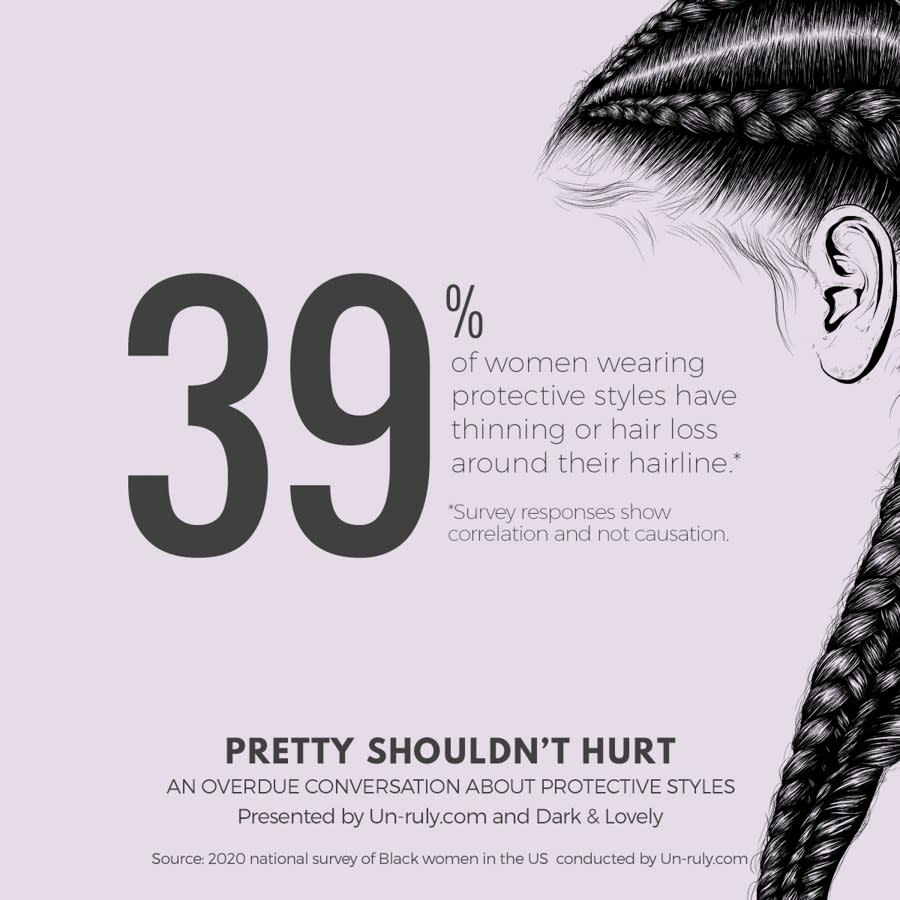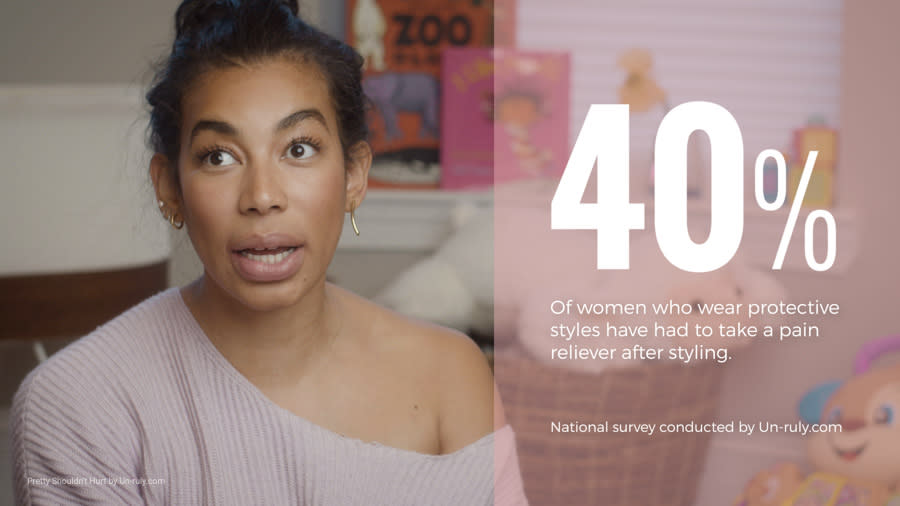'Pretty Shouldn't Hurt': New film explains how hair loss for Black women results in physical and emotional pain
July is BIPOC (Black, Indigenous and People of Color) Mental Health Month, also referred to as Minority Mental Health Awareness Month. This story is part of Yahoo Life’s effort to bring awareness to struggles that people of color face regarding mental health in the U.S.
Box braids. Cornrows. Bantu knots. Senegalese twists. Lace-front wigs. These are just some of the protective hairstyles Black women wear to take a “break” from daily maintenance or to simply switch up their look. But excessive pulling at the scalp and the repetitive nature of braiding and twisting strands without proper technique and care can lead to breakage, or even worse, hair loss.
The age-old belief that “pain is beauty” is deeply rooted in American culture, and it’s part of the reason why so many Black women are willing to sacrifice hours of suffering for the sake of looking good. But what about the damage it inflicts on their mental health?
In the new film Pretty Shouldn’t Hurt, health experts and stylists explain the connection between protective hairstyles for Black women and hair loss, and ultimately, the impact it has on one’s emotional well-being.
A post shared by UN-RULY (@hairunruled) on Jul 9, 2018 at 1:30pm PDT
Documentarian Antonia Opiah was inspired to delve into this controversial topic after a customer of her at-home hairstyling company Yeluchi by Un-ruly informed her that she was “unhappy that her braids were too tight.”
“During that conversation, I asked if she had let the stylist know that she was experiencing some discomfort. And she replied that she didn’t let her know because she thought it was supposed to hurt,” Opiah tells Yahoo Life. “That response made me wonder how many other women thought the same thing or didn’t feel empowered to speak up.”
This discovery eventually led to a collaboration with haircare brand Dark & Lovely to produce a documentary centering Black women’s experiences with hair loss. In the early research phase, Opiah reveals that she was shocked by a study on traction alopecia among women of African descent, which referred to “too tight braiding as traumatic styling and not protective.”

“Obviously, not all braiding is traumatic but it did put into perspective the potential risks involved if our hair isn’t done and cared for correctly,” says Opiah.
She knows this firsthand, having experienced thinning in her mid-20s as a result of wearing extensions right after chemically relaxing her natural hair. Even though the entrepreneur “stopped wearing weaves and switched to wigs,” Opiah confesses that it “didn’t really help.” However, she considers herself lucky for being able to notice the thinning and make changes to her regimen. “I know other women who have more severe hair loss and it can have a deep affect on one’s esteem,” she adds.
Lauren Preston, an experiential marketing and events executive and mother of “four amazing kids” tells Yahoo Life that she faced two major hair losses after pregnancies with her twins and youngest baby girl. “I remember clumps of hair coming out in the shower while washing. I remember being so scared at the time,” she says.

Yet, Preston admits to “thugging it out in the chair” to get protective hairstyles. “For as long as I can remember, I had to endure the pain of my mother combing and styling my thick and curly hair,” she explains. “Getting my hair done, more often than not, was traumatic! I guess it’s been something I carried with me into adulthood that getting your hair hurts and that’s the way that it is, period.”
Because of her experiences, Preston has an “overall fear and distrust of going to Black salons for protective styles.” She finds herself “dreading and anticipating the pain.” She adds, “It’s stressful!”
Celebrity hairstylist and Dark & Lovely ambassador Derick Monroe believes there are clear signs that a woman’s confidence is negatively impacted by hair loss. “They sort of fade in the background. They are not very vocal. They are a lot of times that put themselves down,” he says.
A post shared by Derick Monroe (@derickmonroe) on Jul 27, 2020 at 2:48pm PDT
Monroe urges fellow stylists to respond to clients’ comments like “I’m not pretty” or “My hair looks a mess” with positivity. He explains, “As long as we take the time to nourish and figure out what your issues are, there’s nothing that we can't overcome.”
Model Melanie Fauntleroy tells Yahoo Life that she once believed hair loss was “something that older women experience,” referencing seniors 60 and above. But it wasn’t until a close friend with a flourishing hairline pointed out her very own thinning edges, that this was something that affects women as young as in their 20s.
“I was feeling more frustrated than anything because I felt like I was not able to slick my hair down like all the girls are doing,” Fauntleroy says. “Back in the ‘90s, Chilli from TLC was probably the most prominent person we knew that love to lay her baby hairs down ... I want to wear my hair like this too.”
After trying many DIY hair growth remedies using castor oil, peppermint and eucalyptus essential oils and scalp massages with Vicks vapor rub, Fauntleroy says the documentary has forced her to stop “comparing myself to the beauty standard of the world.” Seeking the professional help of a dermatologist is something she’s also considering.
A post shared by Dr. Kari Williams (@drkariwill) on Jul 23, 2020 at 1:49pm PDT
According to trichologist, celebrity hairstylist and haircare creator Kari Williams, hair is how Black women identify themselves to the world. And when you think about people outside of skin color, hair is a very distinguishing factor that we use to identify individuals.
She explains: “For Black women, especially throughout history ... our hair has been under attack ... something that was covered and damaged during the times of slavery. As we progressed throughout history, knowing that we were coming into a society that was still rejecting us as a people, we transformed our hair for several different reasons.”
Williams believes that not only is Black hair still under attack, but Black people’s identities are under attack. “[So] when a Black woman is experiencing hair loss, the way that she identifies herself through that, when she no longer has that, there’s a sense of loss of self.”
Afiya Mbilishaka, a clinical psychologist and hairstylist, echos this sentiment, noting, “Hair loss can impact other areas of someone’s life, including their romantic relationships, family dynamics and even career success. All of these things are connected to hair loss because of confidence.”
A post shared by Dr. Afiya Mbilishaka (@dr_afiya) on Mar 30, 2020 at 11:19am PDT
When making the connection between cultural practices and hair, Mbilishaka explains: “[In] a lot of traditional African societies, for example, hair is considered highly spiritual because it's the highest point on our entire bodies — and therefore the most connected to the divine. To some degree, our hair is like an antenna connecting us to certain energies around us. And when we don't have hair, then there's potential for a disconnection with our environment and social world.”
No matter how Black women choose to style their hair, Opiah’s goal with the documentary Pretty Shouldn’t Hurt is to “help educate consumers more on whether protective styles are right for them, what to look for when getting their hair done, as well as, how best to take care of their hair.”
Are you a Black woman who enjoys wearing protective hairstyles, but is concerned about hair loss? Below are some tips and product recommendations to treat your hair with TLC:
Find the right hairstylist for you. Monroe strongly suggests having an open dialogue with a potential stylist and paying close attention to how they communicate, as well as their styling technique and familiarity with products and haircare ingredients.
A post shared by Dark and Lovely (@darkandlovely) on Jul 23, 2020 at 1:37pm PDT
Don’t forget to take care of your hair underneath the protective hairstyles. This includes: shampooing your hair or cleansing the scalp at least every two weeks, daily conditioning, wearing a silk scarf or satin bonnet at bedtime and being OK with frizz.
Dark & Lovely’s new Protective Styles Collection takes the guesswork out of hair maintenance. There’s a Tension Tamer with peppermint and avocado oils to help soothe the scalp, Cleansing Water and Hair Refresher to keep your hair refreshed without disrupting your protective hairstyle and a Detangling Cream that works to breakdown buildup and loosen tightly woven strands.
The Dr. K Comb Out Creme is another option for successfully removing protective hairstyles while nourishing your locks. Williams also advises having lots of patience!
Be mindful of what goes inside your body. According to Mbilishaka, there’s often a disconnection between the self-care movement and hair. “It's so critical because what's going on inside of our bodies can actually impact our hair and hair growth,” she says. When people ask her what she does to maintain her very own hair, she explains that it all comes down to consistent wellness practices such as drinking a certain amount of water, getting enough exercise, resting, eating a nutrient-rich diet and stress management.
Read more from Yahoo Life:
